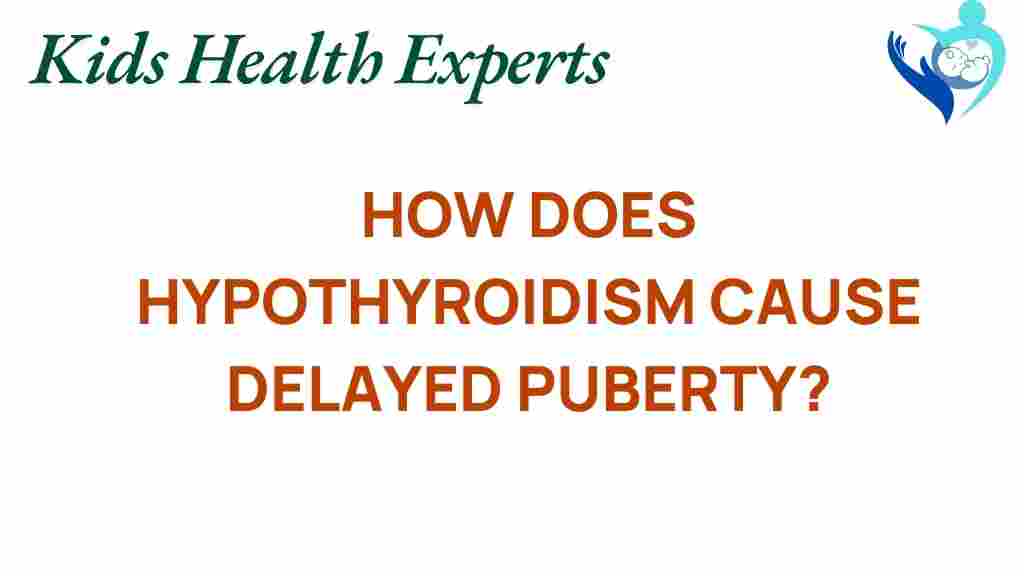Understanding the Link Between Hypothyroidism and Delayed Puberty
Hypothyroidism, a condition characterized by an underactive thyroid gland, can have significant implications for adolescent development. One of the lesser-known effects of hypothyroidism is its potential connection to delayed puberty. In this article, we will unravel this link, exploring how thyroid health influences growth issues and hormonal balance during crucial developmental years. By understanding this relationship, we can gain valuable medical insights into managing endocrine disorders and their impact on young individuals.
What is Hypothyroidism?
Hypothyroidism occurs when the thyroid gland fails to produce sufficient thyroid hormones, which are vital for regulating metabolism, energy levels, and overall growth. Common causes of hypothyroidism include:
- Autoimmune diseases (e.g., Hashimoto’s thyroiditis)
- Thyroid surgery
- Radiation therapy
- Medications that affect thyroid function
- Iodine deficiency
Symptoms of hypothyroidism can vary widely, but they often include:
- Fatigue
- Weight gain
- Cold intolerance
- Dry skin and hair
- Constipation
The Role of Thyroid Hormones in Growth and Development
Thyroid hormones, primarily thyroxine (T4) and triiodothyronine (T3), play a crucial role in growth and development, particularly during childhood and adolescence. They are essential for:
- Regulating metabolic processes
- Supporting brain development
- Facilitating bone growth and maturation
- Influencing the onset of puberty
When thyroid hormone levels are low, as seen in hypothyroidism, it can lead to significant growth issues and delays in the onset of puberty.
How Hypothyroidism Causes Delayed Puberty
The connection between hypothyroidism and delayed puberty can be attributed to several factors:
1. Hormonal Imbalance
Hypothyroidism leads to a deficiency in thyroid hormones, which can disrupt the balance of other hormones in the body. This imbalance can affect the hypothalamic-pituitary-gonadal (HPG) axis, which is crucial for initiating puberty. The HPG axis is responsible for the release of gonadotropin-releasing hormone (GnRH), which stimulates the production of sex hormones.
2. Direct Impact on Growth Factors
Thyroid hormones are known to influence the secretion of growth factors, such as insulin-like growth factor 1 (IGF-1). A deficiency in thyroid hormones can lead to reduced levels of IGF-1, which is critical for normal growth and development during adolescence.
3. Effects on Bone Development
Thyroid hormones promote bone maturation and growth plate closure. Hypothyroidism can delay these processes, resulting in shorter stature and delayed skeletal maturation, both of which are associated with delayed puberty.
4. Psychological and Emotional Factors
Adolescence is a time of significant psychological and emotional development. Hypothyroidism can lead to mood disorders, fatigue, and cognitive impairments, which may further delay the social and emotional readiness necessary for puberty.
Identifying Delayed Puberty in Adolescents
Delayed puberty is defined as the absence of secondary sexual characteristics by age 13 in girls and age 14 in boys. Signs of delayed puberty can include:
- In girls: Lack of breast development, absence of menstruation by age 15
- In boys: No testicular enlargement by age 14
If delayed puberty is suspected, it is essential to consult a healthcare provider for a thorough evaluation, including:
- Medical history and physical examination
- Thyroid function tests
- Hormonal assessments
- Bone age X-ray to assess skeletal maturity
Troubleshooting Tips for Managing Hypothyroidism and Delayed Puberty
If hypothyroidism is diagnosed and linked to delayed puberty, several strategies can help manage the condition:
1. Regular Monitoring and Testing
Regular blood tests to monitor thyroid hormone levels are vital. Adjustments in medication may be necessary to maintain optimal thyroid health.
2. Thyroid Hormone Replacement Therapy
Most patients with hypothyroidism require lifelong thyroid hormone replacement therapy. Common medications include:
- Levothyroxine (Synthroid)
- Liothyronine (Cytomel)
These medications help normalize hormone levels and can positively influence growth and puberty onset.
3. Nutritional Support
A balanced diet rich in essential nutrients can support thyroid health and overall growth. Key nutrients include:
- Iodine
- Selenium
- Zinc
- Vitamin D
Consulting a healthcare provider or nutritionist may help in creating a tailored nutrition plan.
4. Psychological Support
Addressing the psychological and emotional aspects of delayed puberty is crucial. Counseling or therapy can help adolescents cope with the challenges associated with their condition.
Conclusion: The Importance of Thyroid Health in Adolescent Development
Understanding the link between hypothyroidism and delayed puberty is essential for parents, healthcare providers, and adolescents alike. Early diagnosis and intervention can significantly improve outcomes for those experiencing hormonal imbalances and growth issues. By prioritizing thyroid health, we can better support the developmental needs of adolescents and ensure they reach their full potential.
For more information on thyroid health and related topics, visit The American Thyroid Association. If you suspect your child may be experiencing delayed puberty or other growth issues, don’t hesitate to consult a healthcare professional for guidance.
Managing hypothyroidism effectively can pave the way for a healthier, more balanced adolescent development, allowing young individuals to thrive during one of the most critical phases of their lives.
This article is in the category Conditions and created by KidsHealthExperts Team
